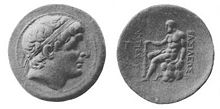Antiochus II Theos
| Antiochus II Theos | |
|---|---|

Coin of Antiochus II. The Greek inscription reads ΒΑΣΙΛΕΩΣ ΑΝΤΙΟΧΟΥ (of king Antiochus).
|
|
| Basileus of the Seleucid Empire | |
| Reign | 261–246 BC |
| Predecessor | Antiochus I Soter |
| Successor | Seleucus II Callinicus |
| Born | 286 BC Syria |
| Died | 246 BC (aged 39 or 40) Asia Minor |
| Spouse |
Laodice I Berenice |
| Issue |
with Laodice: Seleucus II Callinicus Antiochus Hierax Apama Stratonice of Cappadocia Laodice with Berenice: Antiochus |
| Dynasty | Seleucid dynasty |
| Father | Antiochus I Soter |
| Mother | Stratonice of Syria |
| Religion | Greek polytheism |
Antiochus II Theos (Greek: Ἀντίοχος Β΄ ὁ Θεός; 286–246 BC) was a Greek king of the Hellenistic Seleucid Empire who reigned from 261 to 246 BC. He succeeded his father Antiochus I Soter in the winter of 262–61 BC. He was the younger son of Antiochus I and princess Stratonice, the daughter of Demetrius Poliorcetes.
He inherited a state of war with Ptolemaic Egypt, the "Second Syrian War", which was fought along the coasts of Asia Minor, and the constant intrigues of petty despots and restless city-states in Asia Minor. Antiochus also made some attempt to get a footing in Thrace. During the war he was given the title Theos (Greek: Θεός, "God"), being such to the Milesians in slaying the tyrant Timarchus.
During the time Antiochus was occupied with the war against Egypt, Andragoras, his satrap in Parthia, proclaimed independence. According to Justin's epitome of Pompeius Trogus, in Bactria, his satrap Diodotus also revolted in 255 BC, and founded the Greco-Bactrian Kingdom, which further expanded in India in 180 BC to form the Indo-Greek Kingdom (180–1 BC). Then about 238 BC, Arsaces led a revolt of the Parthians against Andragoras, leading to the foundation of the Parthian Empire. These events would have cut off communications with India. Phylarchus relays current scandals regarding his drunken banquets and liaisons with unsuitable young men.
...
Wikipedia
